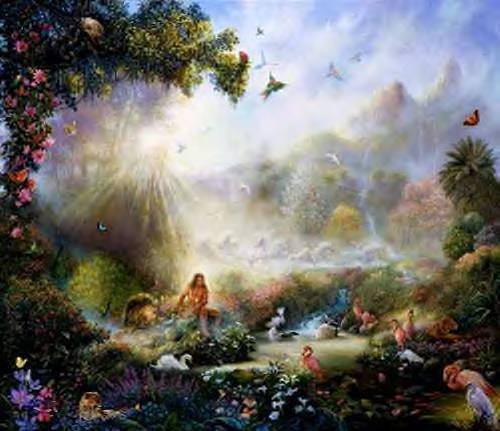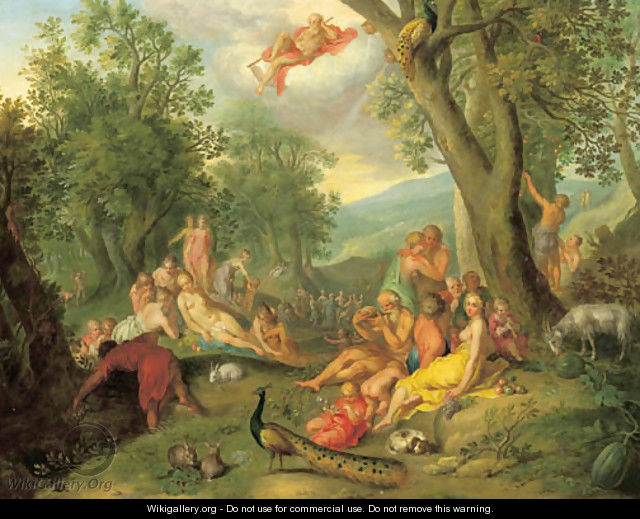|
|
Online Texts for Craig White's Literature Courses
|
|
|
Classical sources on "The Golden Age" |
Abraham Bloemaert (1566-1651), The Golden Age |
Hesiod, Works and Days, trans. Evelyn-White
A golden race of mortal men who lived in the time of Kronos when he was reigning in heaven. And they lived like gods without sorrow of heart, remote and free from toil: miserable age rested not on them . . . The fruitful earth unforced bare them fruit abundantly and without stint. They dwelt in ease and peace upon their lands with many good things. . .
Ovid, Metamorphoses, trans. Innes.
In the beginning was the Golden Age, when men of their own accord, without threat of punishment, without laws, maintained good faith and did what was right. . . . The earth itself, without compulsion, untouched by the hoe, unfurrowed by any share, produced all things spontaneously. . . . It was a season of everlasting spring
compare the Garden of Eden in Genesis
Also compare Plato's Republic, book 2:
Let us then consider, first of all, what will be their way of life, now that we have thus established them. Will they not produce corn, and wine, and clothes, and shoes, and build houses for themselves?
And when they are housed, they will work, in summer, commonly, stripped and barefoot, but in winter substantially clothed and shod. They will feed on barley-meal and flour of wheat, baking and kneading them, making noble cakes and loaves; these they will serve up on a mat of reeds or on clean leaves, themselves reclining the while upon beds strewn with yew or myrtle. And they and their children will feast, drinking of the wine which they have made, wearing garlands on their heads, and hymning the praises of the gods, in happy converse with one another. And they will take care that their families do not exceed their means; having an eye to poverty or war. . . .
But, said Glaucon, interposing, you have not given them a relish to their meal.
True, I replied, I had forgotten; of course they must have a relish-salt, and olives, and cheese, and they will boil roots and herbs such as country people prepare; for a dessert we shall give them figs, and peas, and beans; and they will roast myrtle-berries and acorns at the fire, drinking in moderation. And with such a diet they may be expected to live in peace and health to a good old age, and bequeath a similar life to their children after them.
Yes, Socrates, he said, and if you were providing for a city of pigs, how else would you feed the beasts?
But what would you have, Glaucon? I [Socrates] replied.
Why, he said, you should give them the ordinary conveniences of life. People who are to be comfortable are accustomed to lie on sofas, and dine off tables, and they should have sauces and sweets in the modern style.
Yes, I said, now I understand: the question which you would have me consider is, not only how a State, but how a luxurious State is created; and possibly there is no harm in this, for in such a State we shall be more likely to see how justice and injustice originate. In my opinion the true and healthy constitution of the State is the one which I have described. But if you wish also to see a State at fever heat, I have no objection. For I suspect that many will not be satisfied with the simpler way of life. They will be for adding sofas, and tables, and other furniture; also dainties, and perfumes, and incense, and courtesans, and cakes, all these not of one sort only, but in every variety; we must go beyond the necessaries of which I was at first speaking, such as houses, and clothes, and shoes: the arts of the painter and the embroiderer will have to be set in motion, and gold and ivory and all sorts of materials must be procured. . . .
 |
 |


